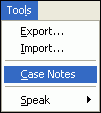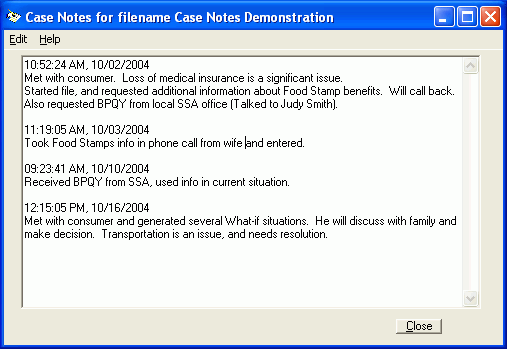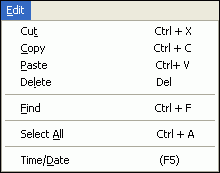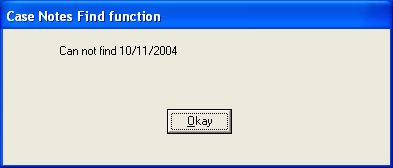

WorkWORLD
 |
 |
||||
| Get Latest WorkWORLD |
|||||
|
Friday - May 16, 2025 |
www.workworld.org |
workworld@vcu.edu |
![]() Case Notes are a feature of the WorkWORLD program that allows you to keep an individual free-form text file of any information you want as part of each saved case file. You can enter, edit, copy, and print this file any time you open the corresponding case file. The notes file is automatically saved each time you save the case file. Case Notes are fully integrated with the built-in WorkWORLD speech features.
Case Notes are a feature of the WorkWORLD program that allows you to keep an individual free-form text file of any information you want as part of each saved case file. You can enter, edit, copy, and print this file any time you open the corresponding case file. The notes file is automatically saved each time you save the case file. Case Notes are fully integrated with the built-in WorkWORLD speech features.
This topic consists of several sections. You may read them all sequentially, or jump immediately to one of them by following the bulleted links below to the sections listed:
There are two different ways to open the Case Notes window, one from the Main Menu, and one from the Toolbar. The Toolbar method is useful when using a mouse, and the Main Menu method may be used with a mouse as well as from the keyboard.

Using a mouse, click on the Tools item on the Main Menu, then click on the Case Notes item on the resulting drop-down menu to open the Case Notes Window.
From the keyboard, hold down the Alt key, then type L to see the drop-down Tools menu. Then type C to select the Case Notes menu item and open the Case Notes window.
![]() +
+ ![]() ,
, ![]()
![]() You can simply click the Case Notes button on the Toolbar to open the Case Notes window. The button is the 7th icon from the left, and shows a hand holding a pencil, writing on a pad of paper. This is a "shortcut" method that performs the same function as the keyboard method described above.
You can simply click the Case Notes button on the Toolbar to open the Case Notes window. The button is the 7th icon from the left, and shows a hand holding a pencil, writing on a pad of paper. This is a "shortcut" method that performs the same function as the keyboard method described above.
Using either method above opens the Case Notes Window, which shows the case file name in the title bar at its top:

You can resize the window by mousing over an edge or corner until the mouse pointer changes to a double arrow, then grabbing the edge by holding down the left mouse button, and finally dragging the edge until the window size is satisfactory:

Alternatively, normal window control buttons are available in the upper right corner of the window to minimize, maximize, restore, and exit the window:
![]()
To access the window control functions from the keyboard, use the normal Windows shortcut keys Alt+Spacebar to open the shortcut menu for the active window:
![]() +
+ ![]()
When you are finished with the Case Notes window, click the Close button at the lower right using your mouse or from the keyboard hold down the Alt key while typing C:
![]() +
+ ![]()
Once open, you can type any information you want into the Case Notes window. It works much the same as the Windows Notepad utility.
Use your Enter Key to begin a new line:
![]()
Lines are automatically word-wrapped to fit within the window size.
You can use the normal Windows clipboard functions to copy text back and forth from Case Notes and any other regular Windows application program.
Case Notes are saved as an integral part of the WorkWORLD Case File each time the case is saved. No separate external file accessible through Windows exists.
If you wish to delete all the Case Notes information for a particular saved case, open the file, open Case Notes, Select All, Delete, close Case Notes, then save the file.
There are two ways to show the drop-down Edit menu items. Using your mouse click Edit on the Case Notes window menu bar, or from the keyboard hold down the Alt key while typing E:
![]() +
+ ![]()
Using either method above reveals the drop-down Edit menu items, which allow you to perform simple editing functions on the text within the Case Notes window:

Cut removes highlighted text within the Case Notes window and places it in the windows clipboard. The normal Windows keyboard shortcut (Ctrl + X) is shown on the menu to remind you that you can cut directly, without opening the Edit menu. After highlighting the desired text, if the Edit drop-down menu is showing then you may also perform a cut by either clicking the Cut menu item or simply typing the shortcut letter T:
![]()
Copy uses previously highlighted text within the Case Notes window and places it in the windows clipboard. The normal Windows keyboard shortcut (Ctrl + C) is shown on the menu to remind you that you can copy directly, without opening the Edit menu. After highlighting the desired text, if the Edit drop-down menu is showing then you may also perform a copy by either clicking the Copy menu item or simply typing the shortcut letter C:
![]()
Paste takes text from the Windows clipboard and copies it to the Case Notes window at the location of the cursor. The normal Windows keyboard shortcut (Ctrl + V) is shown on the menu to remind you that you can paste directly, without opening the Edit menu. After moving the cursor to the desired insertion point, if the Edit drop-down menu is showing then you may also perform a paste by either clicking the Paste menu item or simply typing the shortcut letter P:
![]()
Delete removes highlighted text within the Case Notes. The normal Windows keyboard shortcut (Del) is shown on the menu to remind you that you can delete directly, without opening the Edit menu. After highlighting the desired text, if the Edit drop-down menu is showing then you may also perform a delete by either clicking the Delete menu item or simply typing the Delete key:
![]()
Find performs a search within the Case Notes window text for any string of characters you specify. You can search for a word, part of a word, a date, a name, or any characters you believe may exist in the Case Notes. You may search in either direction from any point you select, and optionally require an exact case match.
The normal Windows keyboard shortcut (Ctrl+F) is shown on the menu to remind you that you can find directly, without opening the Edit menu after selecting the find starting point (by either clicking at the appropriate point or using the keyboard arrow keys to move the cursor). If the Edit drop-down menu is showing then you may also begin a Find operation by either clicking the Find item on the Edit drop-down menu with your mouse or simply type the F key:
![]()
Using either method above opens the Find window, where you specify the text to find and other parameters:

Type the text string you want to find into the Find what box. If you want to only find strings that exactly match in terms of capitalization, check the Match Case box. Then select whether you wish to search up or down from the current cursor position. Finally, click the Find Next button to begin the search.
Moving in the direction you specified, the first instance of the search string will be highlighted in the Case Notes text. Each time you click the Find Next button, the next instance will be highlighted. This process will continue until no further instances of the string are found. The search stops when either the beginning or end of the document is reached, and then a dialog box is displayed:

Select All highlights all the text within the Case Notes window. It is useful when you want to copy all the text onto the Windows clipboard. The normal Windows keyboard shortcut (Ctrl + A) is shown on the menu to remind you that you can select all directly, without opening the Edit menu. If the Edit drop-down menu is showing then you may also perform a select all by either clicking the Select All menu item or simply typing the shortcut letter A:
![]()
Time/Date inserts the current time and date from your computer's internal clock into the Case Notes text at the current cursor position. This allows you to conveniently and automatically date-stamp your entries in Case Notes.
The normal Windows keyboard shortcut (F5) is shown on the menu to remind you that you can insert the time and date directly, without opening the Edit menu after selecting the insertion point (by either clicking at the appropriate point or using the keyboard arrow keys to move the cursor). If the Edit drop-down menu is showing then you may also insert the time and date by either clicking the Time/Date item on the Edit drop-down menu with your mouse or simply typing the D key:
![]()
NOTE: If your computer does not display the correct time and/or date, you must set it by using Date and Time within Windows Control Panel. See your Windows Help for additional information.
There are two ways to show the drop-down Help menu items. Using your mouse click Help on the Case Notes window menu bar, or from the keyboard hold down the Alt key while typing H:
![]() +
+ ![]()
Using either method above reveals the drop-down Help menu items:

Help shows information about Case Notes by displaying the topic you are reading in the Help/Information System. If the Edit drop-down menu is showing then you may display this topic by either clicking the Help menu item or simply typing the H key:
![]()
About WorkWORLD shows information about your installed copy of WorkWORLD software and, optionally, detailed technical information about the hardware and software environment on your computer. This is the same information as that obtained from the program Main Menu Help, About WorkWORLD item. For additional description and information, see the Help, About WorkWORLD topic.
If the Edit drop-down menu is showing then you may display the information by either clicking the About WorkWORLD menu item or simply typing the B key:
![]()
WorkWORLD™ Help/Information System
Topic Title: Case Notes
Topic URL: https://help.workworldapp.com/wwwebhelp/case_notes.htm
Bookmark: To bookmark page, first follow Topic URL link above. Then use (CTRL-D).
Print: Print this topic page.
NOTE: Table of Contents, Index, and Search facilities within the WorkWORLD Help/Information System, if not visible, are available by clicking the blue "Show Navigation" link at the extreme top left of this page. See Using the Help/Information System On The Web for additional information about this and other features of the system.
| Translate this page in a new window by selecting a language below. Machine translation services are offered as a convenience, and should only be used to obtain the "gist" or general meaning of the page content. No endorsement of this commercial service is intended or implied. | |||||||
Spanish | French | German | Italian | Portuguese | Norwegian | Dutch | |
![]() Share/Save: Click the button or link at left to select your favorite bookmark service and add this page.
Share/Save: Click the button or link at left to select your favorite bookmark service and add this page.
This is one topic from the thousands available in the WorkWORLD™ software Help/Information System.
Complete information about the software is available at: http://www.WorkWORLD.org
See How to Get WorkWORLD page at: http://www.WorkWORLD.org/howtogetWW.html
NOTE: Sponsored links and commercial advertisements help make the WorkWORLD™ website possible by partially defraying its operating and maintenance expenses. No endorsement of these or any related commercial products or services is intended or implied by the Employment Support Institute or any of its partners. ESI and its partners take no responsibility for, and exercise no control over, any of these advertisements or their views or contents, and do not vouch for the accuracy of the information contained in them. Readers are cautioned to verify all information obtained from these advertisements prior to taking any actions based upon them. The installed WorkWORLD software does not contain advertisements of any kind.
Copyright © 1996, 1997, 1998, 1999, 2000, 2001, 2002, 2003, 2004, 2005, 2006, 2007, 2008, 2009, 2010, 2011, 2012, Virginia Commonwealth University. All rights reserved.
Page Last Updated: 02/01/2012 06:00:00